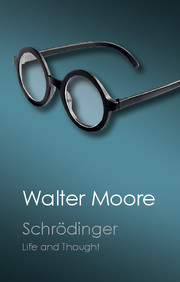Book contents
- Frontmatter
- Contents
- Preface
- Chronology
- Introduction
- 1 Family, childhood and youth
- 2 University of Vienna
- 3 Schrödinger at war
- 4 From Vienna to Zürich
- 5 Zürich
- 6 Discovery of wave mechanics
- 7 Berlin
- 8 Exile in Oxford
- 9 Graz
- 10 Wartime Dublin
- 11 Postwar Dublin
- 12 Home to Vienna
- References
- Name index
- Subject index
6 - Discovery of wave mechanics
Published online by Cambridge University Press: 05 October 2015
- Frontmatter
- Contents
- Preface
- Chronology
- Introduction
- 1 Family, childhood and youth
- 2 University of Vienna
- 3 Schrödinger at war
- 4 From Vienna to Zürich
- 5 Zürich
- 6 Discovery of wave mechanics
- 7 Berlin
- 8 Exile in Oxford
- 9 Graz
- 10 Wartime Dublin
- 11 Postwar Dublin
- 12 Home to Vienna
- References
- Name index
- Subject index
Summary
When schrödinger returned from his summer holidays for the winter semester of the academic year 1925/26, he would have been quite unaware that he was on the verge of an outburst of creative activity that would change forever the world of physics. He had just reviewed and codified his personal world view and it was unlikely that his philosophical outlook would change in any revolutionary way. He had set down his belief in Vedanta and thus in Schopenhauer, through whom the Kantian a priori categories of space and time had been refurbished. During five carefree years in Switzerland, he had been insulated from both the hypocrisy of Vienna and the brutality of German politics. It would not be surprising if Swiss society, with its deep roots in economic security, had made him more conservative in other ways. His more unconventional beliefs, he kept to himself, and neither his inaugural lecture nor My World View was published at this time.
Hermann Weyl once said that schrödinger ‘did his great work during a late erotic outburst in his life’. His marriage with Anny was at a high point of disagreement and tension, with constant talk of breakup and divorce. Their zürich circle provided ample opportunities for amorous adventures, and if Erwin cared to venture outside the usual academic liaisons, both Weyl and Debye were available as competent guides to the uninhibited night life of the city.
Before the breakthrough
The semester began on October 15, and schrödinger had his usual heavy teaching schedule, five hours a week on Theory of Electricity, two hours on Theory of Spectra, a weekly seminar for the electricity course, and the joint seminar with E.T.H., which met for two hours every fortnight. Pieter Debye suggested that Erwin should give a seminar talk on the de Broglie thesis, which had just been published in Annales de Physique.
- Type
- Chapter
- Information
- SchrödingerLife and Thought, pp. 191 - 229Publisher: Cambridge University PressPrint publication year: 2015



